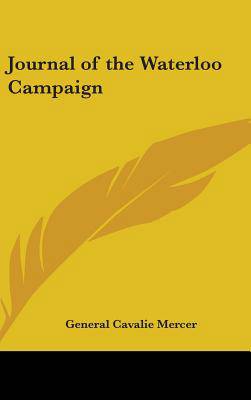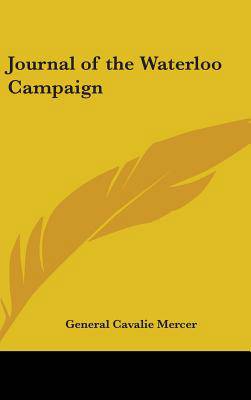
- Retrait gratuit dans votre magasin Club
- 7.000.000 titres dans notre catalogue
- Payer en toute sécurité
- Toujours un magasin près de chez vous
- Retrait gratuit dans votre magasin Club
- 7.000.000 titres dans notre catalogue
- Payer en toute sécurité
- Toujours un magasin près de chez vous
92,45 €
+ 184 points
Format
Description
The Journal of the Waterloo Campaign is a historical book written by General Cavalie Mercer. The book is a first-hand account of the events leading up to the famous Battle of Waterloo in 1815. The author, who was a British officer, was present at the battle and his journal provides a detailed and personal perspective of the campaign.The book is divided into several chapters, each covering a different aspect of the campaign. The author describes the movements of the British and allied forces, as well as the strategies and tactics employed by both sides. He also provides insights into the personalities of the commanders, including the Duke of Wellington and Napoleon Bonaparte.In addition to the military aspects of the campaign, the book also provides a glimpse into the daily life of soldiers during this time period. Mercer describes the living conditions, food, and equipment of the troops, as well as their morale and discipline.The Journal of the Waterloo Campaign is an important historical document that provides a unique perspective on one of the most significant battles in European history. It is a must-read for anyone interested in military history, the Napoleonic Wars, or the history of Europe in the early 19th century.1870. This edition contains both Volumes I and II of this work. Mercer was commander of the G Troop, Royal Horse Artillery, in Wellington's army and achieved fame as the Captain who disobeyed Wellingtons orders to abandon the guns and take shelter with the infantry when the French cavalry closed in. He was in the habit of jotting down notes on the events of the day each evening. This is the account of what he saw and felt from leaving Colchester for Belgium 1815 to his final return to England in 1816. It is a remarkable and compelling account, especially of the three days which ended the career of Napoleon. Mercer's troop was at Quatre Bras, where he got off a few rounds at Napoleon himself, and at Waterloo. There are graphic descriptions of the battles and of his tour over the battlefield the day after, with its appalling scenes of carnage and the sight of the locals looting the dead, and the not-quite dead. It is an outstanding example of the literature of the Napoleonic wars, and it has a rarity as the memoir of an artillery officer, and a troop commander at that.This scarce antiquarian book is a facsimile reprint of the old original and may contain some imperfections such as library marks and notations. Because we believe this work is culturally important, we have made it available as part of our commitment for protecting, preserving, and promoting the world's literature in affordable, high quality, modern editions, that are true to their original work.
Spécifications
Parties prenantes
- Auteur(s) :
- Editeur:
Contenu
- Nombre de pages :
- 736
- Langue:
- Anglais
Caractéristiques
- EAN:
- 9781432626907
- Date de parution :
- 05-04-04
- Format:
- Livre relié
- Format numérique:
- Genaaid
- Dimensions :
- 152 mm x 229 mm
- Poids :
- 1242 g







